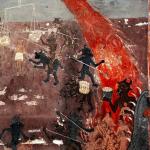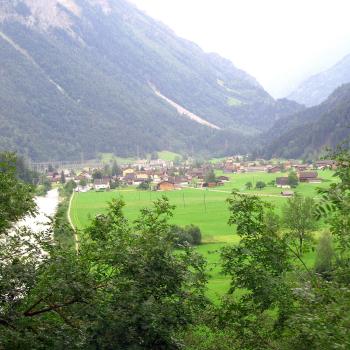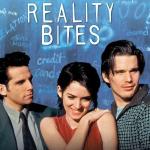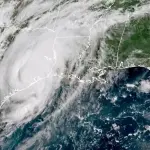
More than any other kind of landscape on earth, Alpine scenery such as this strikes me as a foretaste of heaven. And I love its music.
Every year since I launched this blog, I have called attention to some of my favorite Christmas music. I did it a little bit this year, too, though not to the extent that I’ve previously done and not nearly so systematically. I realize, obviously, that we’re past Christmas now. But it suddenly dawned on me that I had failed to mention one of my very favorite pieces of Christmas music — probably the one that impelled me to start sharing favorite seasonal music in the first place. So, although I’m late with it, I’m not going to let that stop me with this one:
I remember very clearly when and where the marvelous carol “Es ist ein Ros entsprungen” (often called in English “Lo, How a Rose E’er Blooming”), which was given its classical form by the German composer Michael Praetorius in 1609 but which originated sometime before that, first hit me. (I suppose that it’s possible that I had heard the carol before, but, if I had, it hadn’t registered. Not even slightly.) I was attending a Latter-day Saint sacrament meeting in Interlaken, Switzerland, shortly before Christmas 1973. Almost exactly fifty years ago. Curiously, I don’t recall who sang the song. It may have been a branch or district choir.
I was enraptured. Riveted. I had seldom, if ever, heard anything so beautiful before. And “Es ist ein Ros entsprungen” still affects me that way. The German lyrics vary slightly from one printing to another, but I offer here a representative version of the text:
Es ist ein Ros entsprungen,
aus einer Wurzel zart,
wie uns die Alten sungen,
von Jesse kam die Art.
Und hat ein Blümlein bracht
mitten im kalten Winter,
wohl zu der halben Nacht.Das Röslein, das ich meine,
davon Isaias sagt,
hat uns gebracht alleine
Marie, die reine Magd.
Aus Gottes ew’gem Rat
hat sie ein Kind geboren
wohl zu der halben Nacht.
Das Blümelein, so kleine,
das duftet uns so süß,
mit seinem hellen Scheine
vertreibt’s die Finsternis.
Wahr Mensch und wahrer Gott
hilft uns aus allem Leide,
rettet von Sünd und Tod.
And here is a literal and quite unpoetic translation (partially my own) of the lyrics above:
A rose has sprung up,
from a tender root,
As the ancients sang to us.
Its line came from Jesse
And it has brought forth a small flower
In the middle of the cold winter,
In the middle of the night.
The little rose that I mean,
Of which Isaiah told,
Mary alone, the pure maid,
Has brought to us.
By God’s eternal counsel
She has borne a child
In the middle of the night.The tiny flower, so small,
That smells so sweet to us,
With its bright gleam
Dispels the darkness
–True man and true God–
Helps us from all suffering,
Saves us from sin and death.
I’ve always loved the German lyrics. The English words just don’t move me as much — and not merely in the literal and unpoetic version supplied above. But the music is gorgeous in any language. Here’s one rendition of the song that I’ve enjoyed: “Es ist ein Ros Entsprungen”

I share with you now a bit of news that significantly combines both religion and politics: “Ukraine celebrates Christmas on Dec. 25 for the first time, distancing itself from Russia”

My wife and I went out to lunch today with our old friend Louis Midgley. I count getting to know Professor Midgley well, and being able sometimes even to travel with him and his magnificent late wife, Ireta, among the great blessings of my life. At this point, too, knowing him has very specific benefits: We’re gearing up to accompany a cruise around New Zealand in February, and Lou has had a life-long passion for the Land of the Long White Cloud, extending back to even before the first of his two missions there. I was delighted to be able to borrow a copy from him of the new book — the even, as yet, officially, unpublished book — edited by Selwyn Katene and A. Keith Thompson,

Photo by C. M. Lynch (Wikimedia Commons public domain photograph)
Maybe I’m becoming too extravagant? This is an entire folder from the Christopher Hitchens Memorial “How Religion Poisons Everything” File™: “Celebrating Faith in Action: The Church of Jesus Christ in 2023”
And if the horrors chronicled above aren’t enough to send your righteous indignation through the roof, how about this? “The Role Of Churches In Europe’s Refugee Integration”
I disagree pretty frequently with Jana Riess on matters ecclesiastical and I’m confident that we also disagree fairly comprehensively on politics. To be specific, I’m not happy about some of what she says in this column. But I like her reaction to the Giving Machines, which annually provide a wealth of major materials for the Hitchens File: “I volunteered with ‘Light the World’ Giving Machines for Christmas. Here’s what I saw. A church that has been criticized for its vast wealth is trying to do more for charity.”

















